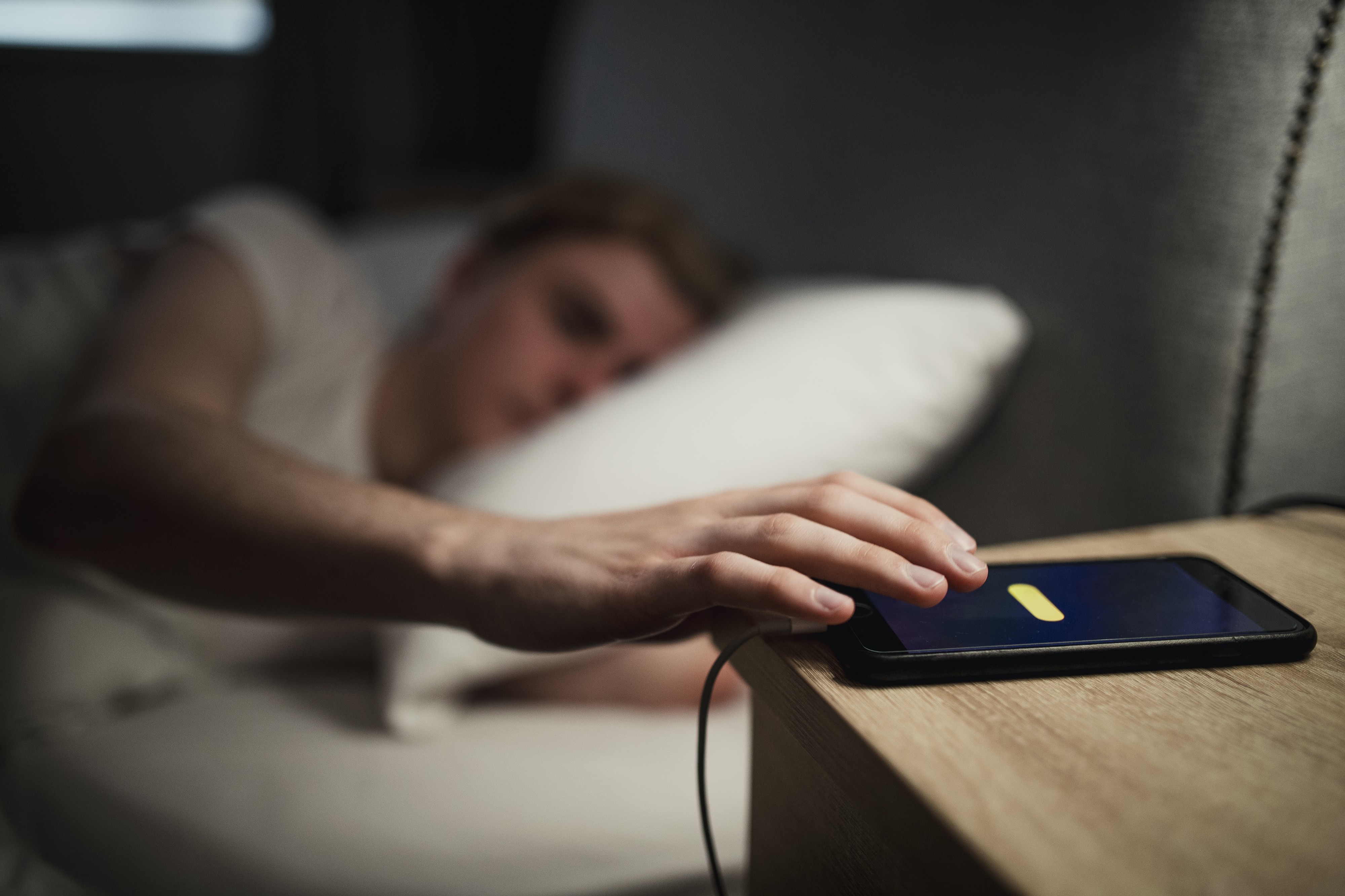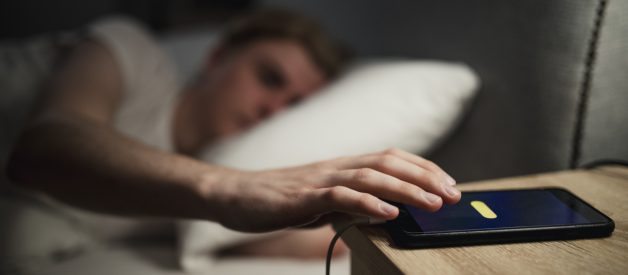Listen to this story
–:–
–:–
The Nuance
Experts disagree over just how worried you should be about smartphone health risks
 Credit: DGLimages/iStock/Getty Images Plus
Credit: DGLimages/iStock/Getty Images Plus
Every week, the Nuance will go beyond the basics, offering a deep and researched look at the latest science and expert insights on a buzzed-about health topic.
 If you?re like the average American, you probably sleep with your smartphone within arm?s reach. A 2015 Bank of America report found that 71 percent of people sleep with or near their phones ? and that includes the 13 percent who said they slept with their phones in their beds.
If you?re like the average American, you probably sleep with your smartphone within arm?s reach. A 2015 Bank of America report found that 71 percent of people sleep with or near their phones ? and that includes the 13 percent who said they slept with their phones in their beds.
Maybe you?ve wondered whether keeping your phone nearby is a bad idea ? perhaps it?s zapping your brain with radio waves or otherwise screwing with your health. It would be comforting if researchers firmly and finally quashed any notions that our devices can cause negative health effects. No such luck.
This past November, the U.S. government?s National Toxicology Program wrapped up a 10-year, $30 million study on the health effects of cellphone radiation exposure. In essence, the government scientists blasted rats with different levels of radiofrequency radiation (RFR) for varying lengths of time and then watched to see what would happen.
?Our studies showed that radiofrequency radiation at the frequencies and modulations used in cellular telecommunications and under the exposure conditions we used can produce adverse biological effects,? says John Bucher, one of the study?s authors and a senior scientist with the National Institute of Environmental Health Sciences. Specifically, Bucher?s study found ?clear evidence? of tumors in the hearts of male rats exposed to RFR, as well as ?some evidence? of tumors in the brains and adrenal glands of male rats. They found ?equivocal? evidence of adverse effects in female rats, meaning it wasn?t clear if the tumors that turned up were caused by RFR exposure.
What to make of these findings? Depends on who you ask.
Bucher says his study was never intended to be the final word on the issue of cellphone radiation and human health. ?We?re using this to put together follow-up research programs,? he says.
Even so, Bucher says there may be some ?low? risk when a phone is held against the head or body ? like if you?re on a call or keeping the phone in your pocket while using some kind of hands-free setup. He says these risks could go up with ?prolonged and persistent use,? though at this point, defining each of these terms is guesswork.
?If there is a risk, I think it?s minimal,? says Larry Junck, MD, a neuro-oncologist and professor of neurology at the University of Michigan. ?We haven?t seen an increase in brain tumors since mobile phone use has become widespread.? Moreover, Junck says the research showing any mechanistic link between cellphone radiation and brain tumors is inconsistent and ?methodologically flawed.?
Others look at the existing research with great concern. ?I think there?s compelling evidence that electromagnetic radiation exposure is indeed harmful,? says Joel Moskowitz, director of the Center for Family and Community Health at the University of California, Berkeley. He reels off the findings of a dozen recent studies, including a 2017 review from China that found heavy mobile phone users were at significantly increased risk of glioma ? a type of malignant tumor in the brain and spinal cord.
A 2018 U.K. study found rates of glioblastoma ? another cancerous brain tumor ? more than doubled in England between 1995 and 2015. Specifically, frontal and temporal lobe tumors ? locations that correspond with where we rest our phones during calls ? showed some of the steepest increases. In a follow-up letter to the journal?s editor, the authors of that U.K. study say they looked closely at the U.S. data on glioblastoma rates. After adjusting for post-2000 population changes ? changes they say are not factored into the U.S. Central Brain Tumor Registry and other databases that track tumors ? they turned up glioblastoma increases similar to the ones they tracked in England.
Brain tumors aren?t the only worry for cellphone users. ?If you look at modern smartphones, the antennas are in the corners ? both upper and lower,? Moskowitz says. But the bulk of the cellular signal is now directed down through the lower antennas, ?which would make the most significant exposures in the neck area,? he says. He mentions tumors of the neck and thyroid as particularly concerning. And there again, some data suggest rates are rising. Rates of thyroid cancer have tripled in the past three decades and are increasing more rapidly than any other type of cancer, according to the American Cancer Society (ACS).
But none of these findings constitute proof that cellphones are to blame. For example, the ACS says the increased use of tumor-detecting thyroid ultrasounds could explain the uptick in rates of those cancers.
?If there is a risk, I think it?s minimal.?
Why is it so hard to pin down the potential health effects of our devices? One gigantic hurdle is that the technologies these devices employ are constantly evolving, and the research on their health effects is often running a decade or two behind. ?Most of the epidemiological studies looking at brain tumor risk collected data in the early to mid-2000s from users who used the old candy bar or flip phones, which were primarily using 1G or 2G cellular technology,? Moskowitz says.
Meanwhile, the telecom industry is now moving forward with 5G technologies, even though health experts still hardly have any data on 4G, he says. (More than 200 scientists and medical doctors have called for a moratorium on the rollout of 5G until its safety can be assured.)
Since this might keep you up at night, let?s get back to the question of sleeping next to your phone. Moskowitz says tumor risks don?t top his list of concerns, because a sleeper?s phone isn?t steadily transmitting the way it does during a call. But he says it?s likely that low-level nighttime radiation exposures could disrupt sleep and cause other neurological effects. He points to a small 2016 study from Germany that found exposing men to cellphone radiation seemed to change the structure of their sleep ? increasing or decreasing REM and other sleep parameters ? though the health ramifications of these shifts aren?t clear.
Whatever risks may exist could be heightened in kids. ?I personally believe that children should be dissuaded from sleeping with a phone under their pillow, as RFR is thought to penetrate farther into their tissues than in adults,? Bucher says.
The obvious advice is to keep your phone out of the bedroom. Or, if you use it as an alarm clock, you could switch it into airplane mode, which stops it from sending or receiving signals, Moskowitz says. He also repeats the longstanding advice to use a wired hands-free device when making calls and to keep your phone away from your body.
Start with all that and hope that the cellphone-radiation Pollyannas turn out to be right.

